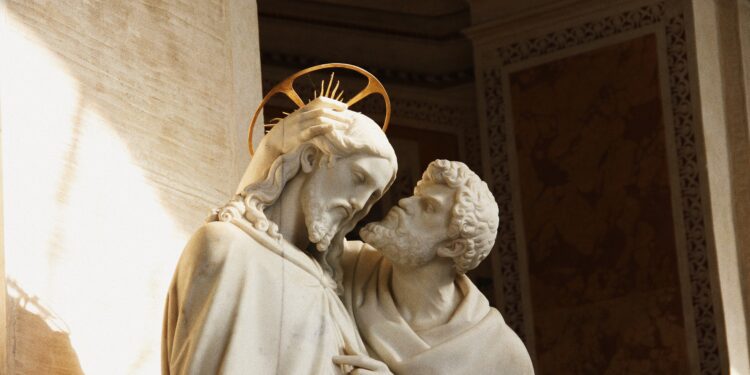Psychoanalyst Aldo Carotenuto, like many, thinks that betrayal is inherent to life and we all experience it from the very beginning. In fact, when a couple is pregnant, they fantasise about the child, they create images, dreams and expectations – some of which are conscious, and some of which are subconscious. We all experienced this sensation of representing our parents’ promise: for us to grow, according to their perspective, meant to develop in the way they dreamt, fantasise and yearned. When we are born we are completely vulnerable and dependant, whereas out parents portray all the light, the good and the power: no wonder we are easily open to blackmail. We need to hold an idealised image of our parents to the point that we remove any negative feeling and we get out of our way to meet their needs and expectations: we do whatever they ask, we are on their side – not ours – and we don’t learn to recognise what we need and want. To healthily grow into ourselves, to become who we are, means to betray this mechanism and, ultimately, our parents. According to Carotenuto, we can only try to find our own identity through this betrayal, we can retrieve ourself despite this betrayal; we can only try to accept the scandal of betrayal and to have trust beyond betrayal.
This concept is beautifully expressed by writer Rainer Maria Rilke in “The man who did not want to be loved”, from The Notebooks of Malte Laurids Brigge. It is a compelling interpretation of the Parable of the prodigal son (Luke 15:11-32). It is quite long, so I have chosen the most significant parts of the text to share with you.
It would be difficult to persuade me that the story of the Prodigal Son is not the legend of a man who didn’t want to be loved. When he was a child, everyone in the house loved him. He grew up not knowing it could be any other way and got used to their tenderness, when he was a child. But as a boy he tried to lay aside these habits. He wouldn’t have been able to say it, but when he spent the whole day roaming around outside and didn’t even want to have the dogs with him, it was because they too loved him; because in their eyes he could see observation and sympathy, expectation, concern; because in their presence too he couldn’t do anything without giving pleasure or pain. But what he wanted in those days was that profound indifference of heart which sometimes, early in the morning, in the fields, seized him with such purity that he had to start running, in order to have no time or breath to be more than a weightless moment in which the morning becomes conscious of itself.
The secret of that life of his which had never yet come into being, spread out before him. Involuntarily he left the footpath and went running across the fields, with outstretched arms, as if in this wide reach he would be able to master several directions at once. And then he flung himself down behind some bush and didn’t matter to anyone. He peeled himself a willow flute, threw a pebble at some small animal, he leaned over and forced a beetle to turn around: none of this became fate, and the sky passed over him as over nature.….
Can he stay and conform to this lying life of approximations which they have assigned to him, and come to resemble them all in every feature of his face? Can he divide himself between the delicate truthfulness of his will and the coarse deceit which corrupts it in his own eyes? Can he give up becoming what might hurt those of his family who have nothing left but a weak heart?
No, he will go away. For example, while they are all busy setting out on his birthday table those badly guessed presents which, once again, are supposed to make up for everything. He will go away forever. Not until long afterward would he realize how thoroughly he had decided never to love, in order not to put anyone in the terrible position of being loved. He remembered this years later and, like other good intentions, it too had proved impossible.
For he had loved again and again in his solitude, each time squandering his whole nature and in unspeakable fear for the freedom of the other person.….
And in one old face, grown suddenly pale, recognition breaks through. Recognition? Is it really just recognition? — Forgiveness. Forgiveness of what? — Love. My God: it is love.
He, the one who was recognized, had no longer thought, preoccupied as he was, that love could still exist. It is easy to understand how, of everything that happened then, only this has been handed down to us: his gesture, the incredible gesture which had never been seen before, the gesture of supplication with which he threw himself at their feet, imploring them not to love. Dizzy with fright, they made him stand up, embraced him. They interpreted his outburst in their own way, forgiving him. It must have been an indescribable relief for him that, in spite of the desperate clarity of his posture, they all misunderstood him. He was probably able to stay. For every day he recognized more clearly that their love, of which they were so vain and to which they secretly encouraged one another, had nothing to do with him. He almost had to smile at their exertions, and it was obvious how little they could have him in mind.
How could they know who he was? He was now terribly difficult to love, and he felt that only One would be capable of it. But He was not yet willing.
You are the One. You are the one and only person that can give yourself the love you want and need, if you are willing to overcome the betrayal. How do you feel about it? Have you found your independence yet, or do you still feel connected with your parents through the umbilical cord? If you are a parent, how is it that you are loving your child? What kind of dreams and expectations do you hold for them? Have you ever thought of how to love them means to let them be simply who they are?
I also want to share the Overture of Mozart’s Don Giovanni. A piece that starts in the darkness of the underworld, to then end with a festive tone, full of joy and hope.






